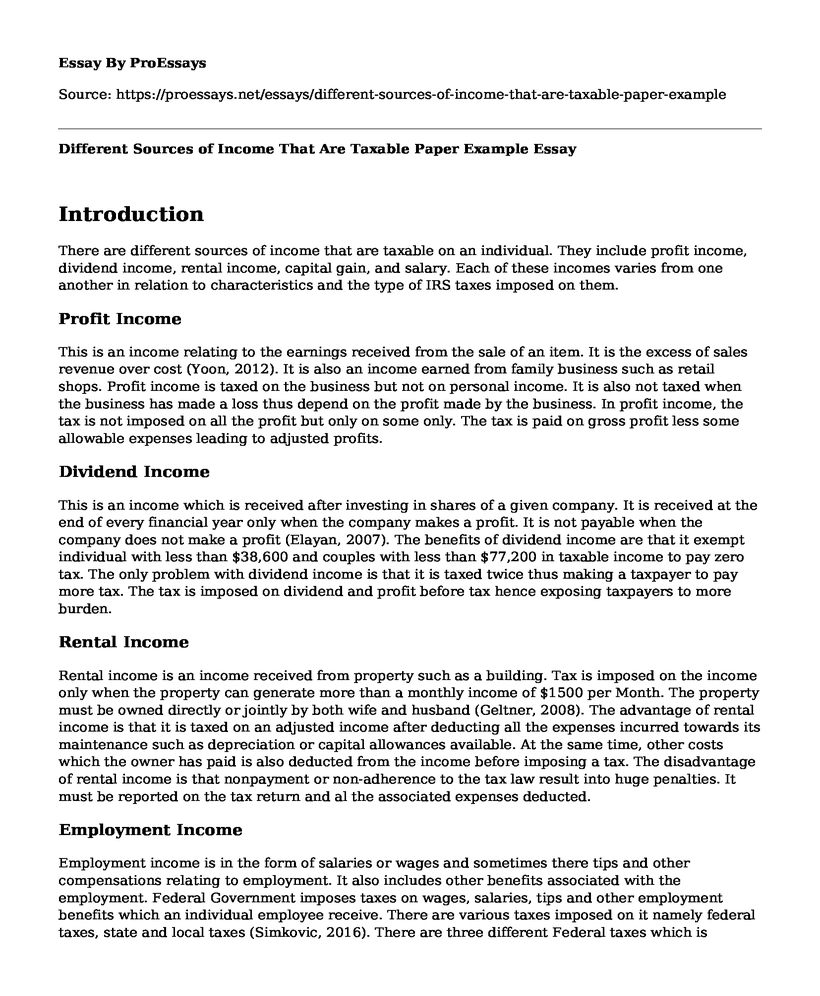Introduction
There are different sources of income that are taxable on an individual. They include profit income, dividend income, rental income, capital gain, and salary. Each of these incomes varies from one another in relation to characteristics and the type of IRS taxes imposed on them.
Profit Income
This is an income relating to the earnings received from the sale of an item. It is the excess of sales revenue over cost (Yoon, 2012). It is also an income earned from family business such as retail shops. Profit income is taxed on the business but not on personal income. It is also not taxed when the business has made a loss thus depend on the profit made by the business. In profit income, the tax is not imposed on all the profit but only on some only. The tax is paid on gross profit less some allowable expenses leading to adjusted profits.
Dividend Income
This is an income which is received after investing in shares of a given company. It is received at the end of every financial year only when the company makes a profit. It is not payable when the company does not make a profit (Elayan, 2007). The benefits of dividend income are that it exempt individual with less than $38,600 and couples with less than $77,200 in taxable income to pay zero tax. The only problem with dividend income is that it is taxed twice thus making a taxpayer to pay more tax. The tax is imposed on dividend and profit before tax hence exposing taxpayers to more burden.
Rental Income
Rental income is an income received from property such as a building. Tax is imposed on the income only when the property can generate more than a monthly income of $1500 per Month. The property must be owned directly or jointly by both wife and husband (Geltner, 2008). The advantage of rental income is that it is taxed on an adjusted income after deducting all the expenses incurred towards its maintenance such as depreciation or capital allowances available. At the same time, other costs which the owner has paid is also deducted from the income before imposing a tax. The disadvantage of rental income is that nonpayment or non-adherence to the tax law result into huge penalties. It must be reported on the tax return and al the associated expenses deducted.
Employment Income
Employment income is in the form of salaries or wages and sometimes there tips and other compensations relating to employment. It also includes other benefits associated with the employment. Federal Government imposes taxes on wages, salaries, tips and other employment benefits which an individual employee receive. There are various taxes imposed on it namely federal taxes, state and local taxes (Simkovic, 2016). There are three different Federal taxes which is imposed on employment income. Federal Government imposes the tax on net self-employed income and employment income. The employer pays to withhold tax to the employee before payment of income tax. The only advantage of employment income is that there are other employment benefits which are exempted from tax and this increases the disposable income of a taxpayer. At the same time, the taxpayer also has a tax limit in which the tax is imposed. It, therefore, means that tax is not imposed on al incomes of an individual.
Capital Gain
This is an income received after selling an asset. It is a profit received after disposing of anon inventory asset. Capital gain is not imposed on all assets and therefore it increases the net income of an individual. The advantage of capital gain income is that it is not taxed on all the assets but only for some fixed assets which are not meant for resale. Its disadvantage is that it increases the tax burden to the taxpayer thus reduces disposable income.
References
Simkovic, Michael (2016). "Taxes, Subsidies, and Knowledge: A Reply to Professor Oei". University of Chicago Law Review Dialogue. SSRN 2761682
Yoon Oh. (2012). A proposal to improve capital gain taxation in Korean income tax law. Journalof IFA, Korea, 28(2), 177-221. doi:10.17324/ifakjl.28.2.201208.006
Geltner, D. (2008). The Income Tax Penalty on Rental vs Owner-Occupied Housing: An Argument for Apartment Rent Tax Exemption. SSRN Electronic Journal. doi:10.2139/ssrn.2585559
Elayan, F. A. (2007). To Tax or Not to Tax Income Trusts: The Valuation Effect of a Canadian Dividend Tax Cut. SSRN Electronic Journal. doi:10.2139/ssrn.1078198
Cite this page
Different Sources of Income That Are Taxable Paper Example. (2022, Sep 20). Retrieved from https://proessays.net/essays/different-sources-of-income-that-are-taxable-paper-example
If you are the original author of this essay and no longer wish to have it published on the ProEssays website, please click below to request its removal:
- Strategic and Financial Performance and Position of Gamuda Berhad, a Malaysian Engineering Company
- Banking Retail Product Development or Customer Satisfaction, Effect of Management Decision
- Essay Example on JPMorgan Chase: Largest Bank in US, 6th Largest Worldwide
- Essay Example on Asia and America: Top Economies & Markets for Business Investments
- Paper Example on Organizational Financial Sustainability: Book vs Journal
- Financial Analysis of Starbucks (2000-2005)
- Essay on Affordable Health Insurance Marketplaces: Government Policies for Managing Healthcare







